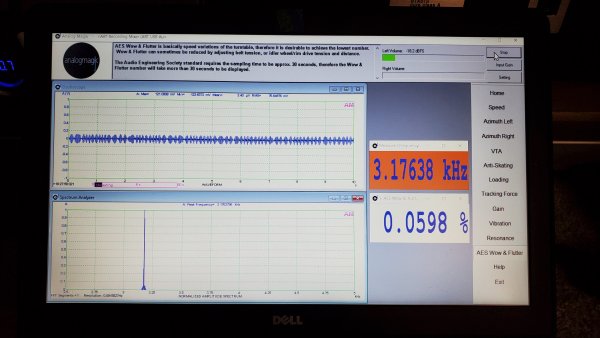Well, nearly 6 months on from posting this thread in genuine curiosity mixed with some skepticism, I can really report this stuff is critical.
On my old stock motor, where there didn't "appear" to be any major SQ variation at 33.000 v 33.333 v 33.666, I took a lot of convincing to go down the route of guaranteeing 33.331-33.335, often 33.333. My perception at +/- 0.3% error was of no real difference to ideal, so why spend £1.5k guaranteeing +/-0.03%?
If "hearing is believing" before, then the audible uptick with new motor is more "hearing is convincing". It took a day for the motor to run in and show it's stuff, and the change is radical and deeply addictive.
I'm gonna agree with Lagonda here, it's not the absolute numerical speed accuracy that's most critical, it's the lack of moment to moment waver. So where my old motor would literally wow in and out like waves on an ocean, swirling and receding second to second, sometimes from 33.100 to 33.600 and back in the space of two revolutions, the SOTA Eclipse motor I'm now using is 99% of the time at 33.332 to 33.334, only very occasionally varying lower or higher.
This lack of cyclical swings and roundabouts is making the critical difference. And WHAT a difference! I know I'm prone to that awful audiophile malady Epiphanous Pretentiousity, but the change here is of an order of magnitude greater than any other changes, save for my room acoustics uplift (actual room move and major bass suckout solution), and isolation of tt via Stacore/correct analog setup. I would say by having these factors sorted, the uplift from minimal speed drift with the new motor is magnified.
Where I'm so happy is the dramatic turnaround on classical. The Janacek/Mládi piece I listened to the other day is transformed from a tad grey and smeared to uncluttered, hugely transparent, dynamics especially improved, timbral accuracy and air to spare. For the first time, classical music that always felt shut in and gritty via my Zus, is sounding much more independent of the spkrs, way closer to the great systems I've heard in the last few years.
I think it's the combination of the joy of a situation I was having a hard time being convinced could result, nailing once and for all that Zus can be hugely transparent, and literally opening up hundreds of my classical and jazz albums to new appreciation, that has made this stage of my system evolution the most joyous one.
I can only thank my good friend running the same tt/arm who kept me in the loop on this change as I remained hugely skeptical.








